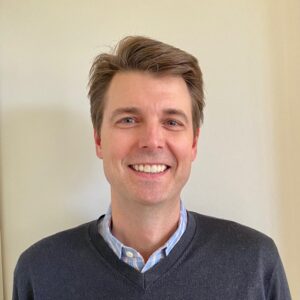
Hodges, who is currently Vice President & General Manager Americas for the Global Products Division of Owens & Minor, a FORTUNE 500 global healthcare logistics company, knows a thing or two about the career preparation provided by a history degree. As a member of the department’s Career Mentor Coalition (described in last Spring’s newsletter), Hodges partners with other alumni of the department to provide professional advice and mentoring to history majors and minors in the early stages of their careers. “I was not alone when I think about my colleagues in the business world. Most of them are from liberal arts backgrounds. Even the highly competitive investment banks will also value a liberal arts background. It’s my belief that I wasn’t unique.” Hodges’ advocacy for the value of historical training finds reflection in his support for the efforts of the department, and the university, to reckon with the uglier chapters of Carolina’s past.
A recipient of the prestigious Morehead-Cain scholarship who came to Carolina from the North Shore of Massachusetts, Hodges got “hooked” into history while taking a course with Joel Williamson (1929-2019), a distinguished historian of the American South who taught in the department for 43 years and held the Lineberg Professorship of the Humanities. “He was such an amazing teacher, and I ultimately decided to write my senior thesis under his mentorship. Based on his class, the Wilmington Race Riot (really the massacre and coup of Wilmington of 1898) was a topic that fascinated me.” Conducting research for his thesis proved to be a formative experience. “I did not have a very disciplined academic path, but that was the topic that got me going. It was the History Department, Joel’s mentorship, and this thesis topic that ignited my studies. I spent a year in Wilson Library going through microfilm and microfiche. That became the core of my academic life and a focal point of my studies.”
Journalism might have been a logical career path for Hodges after college given his family’s broad liberal arts background (though his father was in finance). In his junior year, however, he did an internship with a company in Chicago, and found the experience eye-opening. “I liked that environment, I liked working with people who have a purpose of making a product, and I started pursuing those opportunities after college.” Hodges entered a management training program at SmithKline Beecham (now Glaxo SmithKline), a company with a long history of recruiting at Carolina, that involved rotational assignments in different business areas. He acquired multidisciplinary exposure in positions that took him across the U.S., to England, and to Mexico City. In all these roles, Hodges feels strongly that historical training served him well. “Regardless of what profession you choose for your career journey, the history degree gives you the foundation of critical thinking, of the core discipline of research, the ability to solve problems by creating a hypothesis and having to prove or disprove that hypothesis through critical thinking, and ultimately communicating, both in writing and orally, that point of view in a persuasive way. Those skills are core to any profession, and you get all those skills in a history degree.”
Though Hodges has enjoyed a multifaceted international career since his student days, he has always attached great importance to spreading awareness about the university’s racist past. On a visit to the campus bookstore in January 2020, right before the pandemic, Hodges picked up a copy of David Zucchino’s Pulitzer Prize winning Wilmington’s Lie: the Murderous Coup of 1898 and the Rise of White Supremacy (Grove Press, 2020) and leafed through the bibliography. “Oh my gosh!” he recalls telling himself. “My thesis was cited a couple times and David and I had a good exchange as a result of that.” The experience reinforced Hodges’ belief in the need to educate Carolina students, and the North Carolina public, about the devastating impact of White supremacy on the state’s history. “When you think about 1898, where you’re barely 40 years after the Civil War and slavery ended, that you had this vibrant community including middle class professionals in positions of political power at a local level, but also at a professional level, and a thriving community in Wilmington, NC, suddenly desecrated, you sit back and think what would life have been like, what would 2021-2022 be like, for the African American community if those events, and later Jim Crow had not happened?” Hodges has been a passionate advocate for the removal of White supremacist Josephus Daniels’ name from the official title of the Student Stores, and believes the department should regularly offer a course on racism in North Carolina at the turn of the century. He strongly supports the department’s petition to officially rename our building Pauli Murray Hall. “I was absolutely inspired by her revolutionary work in the early days of civil rights, how she influenced Thurgood Marshall and ultimately became an Episcopalian priest late in life.” The importance of these efforts to reckon with UNC’s racist past could not be more clear-cut in his view. “Let’s make sure we are not naming buildings after people whose legacy is a stain on the university and who do not need to be honored.”
Hodges, whose eldest daughter graduated from Carolina last year, is passionate about the university and about our department. Last year, he and his spouse generously created the The Hodges Family Graduate Student and Faculty Excellence Fund in the Department of History to support research and teaching in African American history. In addition, through his advocacy and support for our recent alumni, he continues to play an important and active role in departmental life, and serve as a model for our majors, both as a business professional and as a historian.
